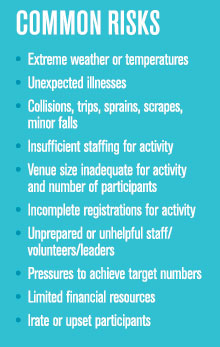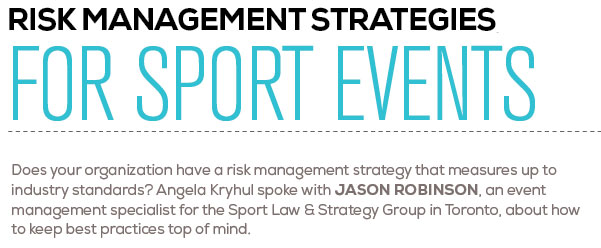What keeps sport event managers up at night?
Logistics… participant safety (the possibility of serious injury or fatality)… and a lack of resources are the most common worries. Sometimes it’s the pressure to meet numbers or certain success criteria. My goal is to mitigate the risks that cause those sleepless nights and have negative implications for events. I also encourage sport event managers to expand their thinking beyond the obvious risks to include things that hinder their ability to achieve an event’s desired outcomes, such as communication issues, a poorly activated sponsorship that leads to the loss of a partner and revenue, or even negative social media feedback.
 Do most sport event managers have a risk management plan?
Do most sport event managers have a risk management plan?
It varies, depending on the sport. A lot of it has to do with resources and the abilities of the organizing groups. I think most organizations have a plan or a sense of what to do, but whether that plan is a formal written document with a set of behaviours that are actually followed, is another matter. When I ask the groups we work with whether they have a risk management policy for their events, emergency action plans, risk registries, written hosting standards, post mortems or cancellation guidelines, the majority does not necessarily have all of those measures in place.
How does a sport event organizer ensure they’re meeting a generally accepted or reasonable standard of care?
Knowing the current standards that exist in your sport is a great start. Developing a risk management plan that incorporates those standards is the next logical step. Try drawing a line on a piece of paper. Below the line, list the event items or tasks, which, if you were not to fulfill, would be considered a sign of negligence. Examples include improper equipment, poor signage, lack of water, unsigned waivers, etc. Above the line, list all the things you can do that are above and beyond the industry standards (what is expected). Examples include exceptional staff training, specified requirements for rest stations and thorough Assumption of Risk Agreements. That line goes up and down depending on the type of sport and the standards that currently exist.
How can an organization keep risk awareness top of mind?
Risk management is a structured and systematic process where the organization spends time thinking about risky situations, the likelihood and consequences (or severity) and how to address them. By developing a risk management plan, you can make risk awareness a part of your staff rules, training and development sessions, event documentation and daily communications. Positively and proactively responding to risks through active risk management planning can
lead to improvements in your operational effectiveness, resource development and your brand reputation.






